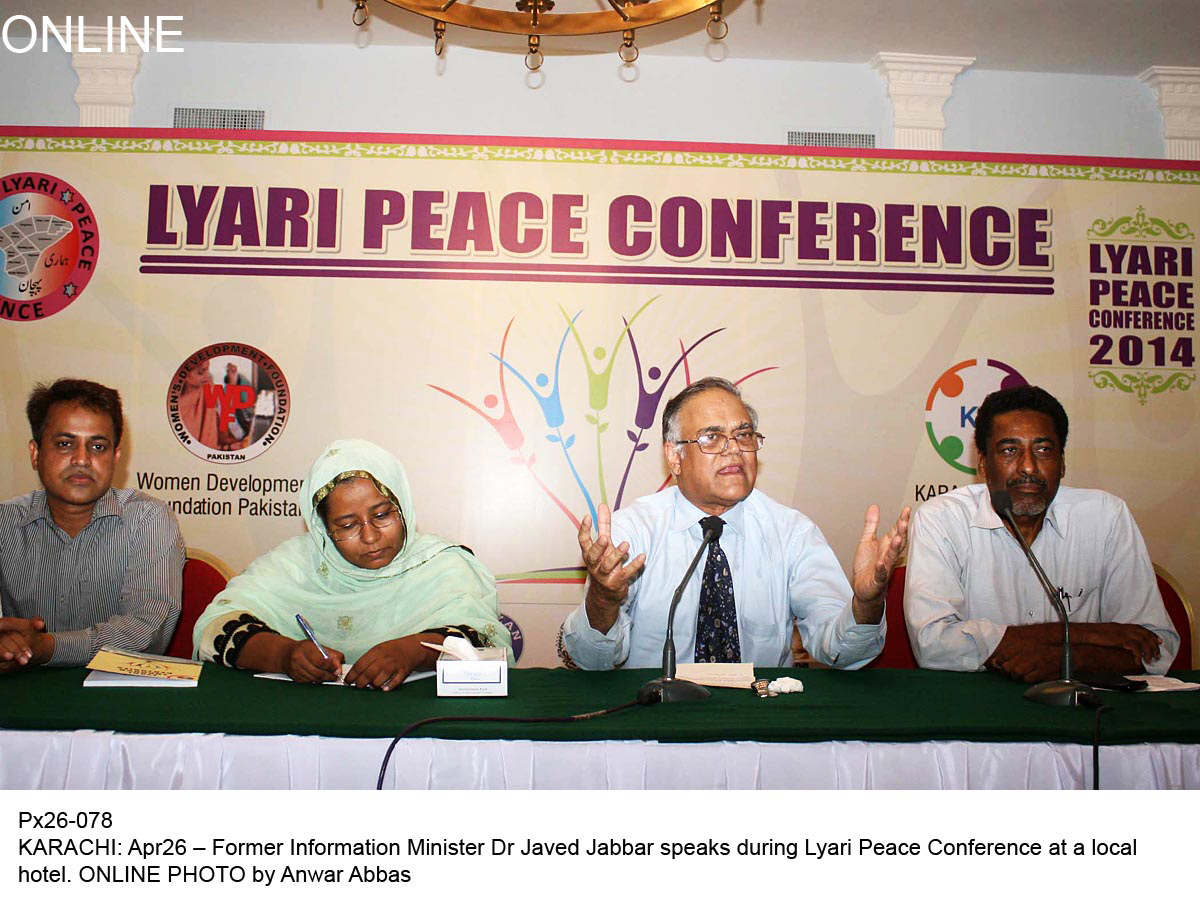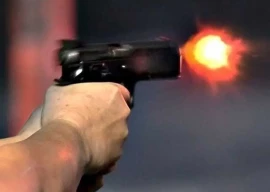
Lyari, perhaps the most troubled area of Karachi, needs elimination of the political cover provided to armed gangs and complete deweaponisation in order to restore peace in the region.
Social workers, historians and journalists from Lyari agreed to these points in a session at the Lyari Peace Conference on Saturday at the Beach Luxury hotel. The Women Development Foundation Pakistan and Karachi Youth Initiative organised the day-long conference in collaboration with the ActionAid.
Journalist and civil society activist from Lyari, Abdul Latif Baloch, asked for the deweaponisation of the area in his speech titled ‘A walk through Lyari’. Baloch called the Lyari unrest a ‘political issue’ and felt that if politics is removed from Lyari, the violence in the area will cease to exist.
“The people of Lyari have no personal enmities,” said Baloch. “The fight being fought in Lyari is not the fight of the Baloch people. It has been imposed upon them from outside and prominent political personalities are controlling it.”
Baloch added that the people of Lyari have simple desires and just want to play sports and dance to drums. “Lyari casts its vote without any hidden intentions but its people are being used by outsiders who have worsened the situation.”
He then reminisced about the peaceful days of Lyari and compared them with the present situation. “Today I feel frightened to even step outside my home and I see strange faces everywhere,” he said. “The situation has gone so much out of control that even those who are responsible for the unrest are now unable to enter Lyari.”
Baloch’s call for peace in Lyari was seconded by historian Gul Hassan Kalmatti, who cited the example of the Mewashah Graveyard as a symbol of harmony and peace in the Lyari of the past. “Muslims, regardless of their sects, and even Jews, Christians and Hindus used to bury their dead side by side at Mewashah, showing the harmony among the people of Lyari at the time,” he recalled. “The people of Lyari have to come forward and fight those who spread hatred.”
Kalmatti also talked of Ibrahim Lasi and Ghulam Muhmmad Lasi, who were international cricket players hailing from Lyari, during the British Raj, but are never discussed or recognised.
He then took the audience on a trip down memory lane and told them that, before partition, the present Cheel Chowk was first named after Abraham Rubin, a Jewish mayor of Karachi. After partition, it was renamed after Maulvi Usman and when the Karachi Metropolitan Corporation started municipal works in Lyari, they sculpted an eagle on the Chowk, which gave it its current name.
ActionAid regional manager for Sindh and Balochistan Shahjahan Baloch criticised the gun culture and felt that the message of peace should be preached in the area.
For social worker Shireen Rehmatullah, the plight of Lyari was because of its people indulgence in self-pity and the sense that they cannot do anything because they are poor and weak. She said the question of why Lyari is being left behind was being asked way back in 1953 and it is still being asked today. “We get the answer from its people that they can’t do anything. When electricity came to Karachi, it was provided to the Parsi Colony and Clifton, and Lyari was ignored. Its people accepted it by saying ‘we are poor; therefore, it’s okay’,” she said, challenging the people of Lyari to step forward and throw away their sense of powerlessness.
Published in The Express Tribune, April 27th, 2014.
COMMENTS (2)
Comments are moderated and generally will be posted if they are on-topic and not abusive.
For more information, please see our Comments FAQ

1732441915-0/BeFunky-collage-(12)1732441915-0-165x106.webp)

1732438802-0/BeFunky-collage-(11)1732438802-0-165x106.webp)













Great initiative. Those criticizing the organizers should do their homework. Women Development does work all over Karachi and KYI works all over Lyari. Just today I heard they sponsored a cricket tournament in Kalri. Stop critiquing and do something yourself.
The organizers had to invite all communities living in Lyari. It is unfair to highlight one community that has created bad name for Lyari. Not only Baloch but the contribution of other communities is more powerful and worth mentioning but I think Organizers just know a few people in Lyari, that's the main reason they dont cross Aath Chowk